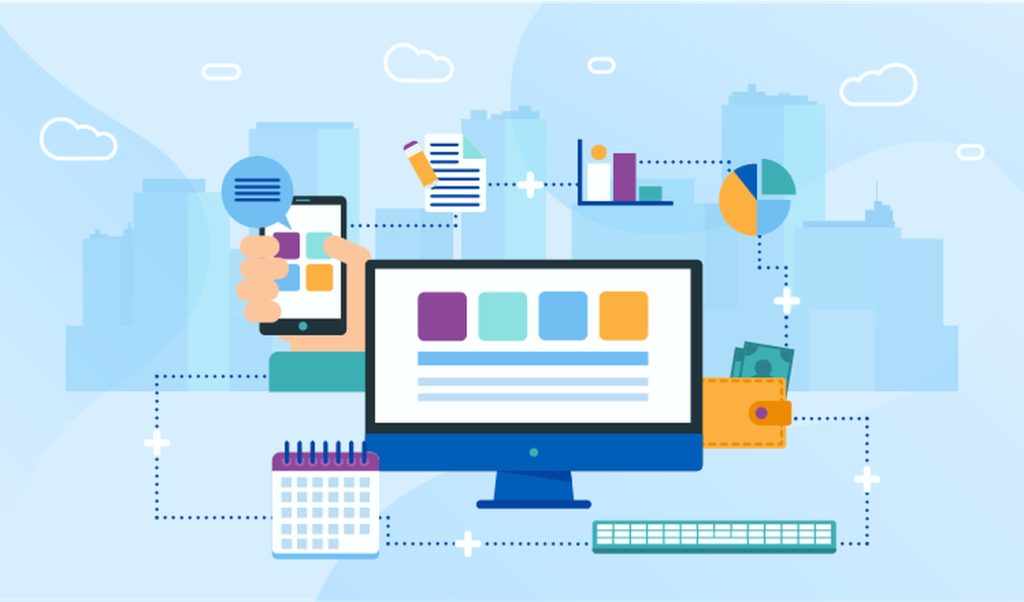
5 Major Advantages of Web Apps You Should Know
Topic started 1 day
Last Post 1 day ago
I. What is Enterprise Software?
II. Why is enterprise software important?
III. Top 5 Enterprise Software Examples to Boost Business Efficiency
IV. Conclusion

In today’s rapidly evolving digital landscape, businesses are constantly seeking innovative software solutions to streamline operations and boost overall efficiency. Enterprise software has become a cornerstone in this transformation, enabling organizations to automate processes, manage data more effectively, and make smarter, data-driven decisions. As we move into 2024, advanced software solutions such as ERP, CRM, HRM, SCM, and BI are not only optimizing business performance but also providing companies with a competitive edge in a fast-paced market. In this article, we will explore the top five enterprise software examples that are poised to drive business efficiency and deliver significant operational improvements.
Enterprise software refers to a category of software solutions designed to meet the complex needs of large organizations and businesses. Unlike consumer software, which is typically aimed at individual users, enterprise software focuses on automating and supporting core business processes across various departments, such as finance, human resources, supply chain management, and customer relationships. It helps organizations improve efficiency, ensure data consistency, and streamline operations at scale.
Key characteristics of enterprise software include:
Enterprise software is crucial for modern businesses due to its ability to streamline and automate complex operations, improve decision-making, and enhance overall efficiency. Here are the key reasons why enterprise software is important:
Enterprise software automates repetitive and manual tasks, reducing human error and freeing up resources for more strategic activities. Whether it’s managing finances, tracking inventory, or processing payroll, automation leads to faster and more efficient operations.
Enterprise software enables seamless collaboration across various departments within an organization. For example, CRM systems help sales, marketing, and customer support teams share information in real-time, ensuring that everyone works towards the same goals and has access to the same data.
With enterprise software, businesses can access real-time data and generate actionable insights. Tools like Business Intelligence (BI) software analyze vast amounts of data, allowing organizations to make informed decisions based on accurate, up-to-date information, improving both short-term and long-term planning.
Enterprise software solutions are designed to scale with the growth of a business. As a company expands, the software can easily accommodate increased data, users, and transactions, making it an essential tool for businesses aiming for long-term growth.
By integrating various functions—such as accounting, human resources, supply chain management, and customer relationship management—into one platform, enterprise software reduces the time spent on administrative tasks. This leads to increased productivity and allows employees to focus on value-driven activities.
Enterprise software is equipped with advanced security features to protect sensitive company data, ensuring compliance with industry regulations and standards. This is particularly important in sectors like finance, healthcare, and manufacturing, where data security and regulatory compliance are critical.
Though enterprise software can be expensive to implement initially, it leads to cost savings in the long run by improving efficiency, reducing errors, and cutting down on manual labor. Additionally, it helps in optimizing resource allocation and minimizing wastage.

SAP S/4HANA is one of the most powerful enterprise resource planning (ERP) systems, used by businesses worldwide to manage their operations and resources effectively.
Benefits:
S/4HANA harnesses cloud technology and big data, providing advanced analytics tools that empower companies to make faster, more accurate decisions. It enables businesses to stay agile and competitive by improving productivity and enabling proactive strategies.
Salesforce is a widely popular customer relationship management (CRM) platform that helps businesses manage customer data and foster sustainable relationships.
Benefits:
Due to its flexibility and customizability, Salesforce is suited for businesses of all sizes, helping them optimize their customer strategies and boost profitability. Its capability to tailor customer engagement and deliver insights makes it invaluable for improving customer loyalty and increasing sales.
Workday is a comprehensive human resource management (HRM) solution that provides tools for workforce planning, payroll, and talent management.
Benefits:
Workday is especially beneficial for organizations looking to streamline HR processes, ensuring compliance with labor laws and fostering a culture of continuous improvement. Its analytics help HR teams make data-driven decisions that promote employee engagement and development.
Oracle SCM is a robust supply chain management (SCM) software that helps businesses manage their entire supply chain, from production to delivery.
Benefits:
Oracle SCM allows businesses to monitor the entire supply chain, reduce costs, and increase efficiency. By offering real-time insights, it helps organizations anticipate disruptions and adjust operations to maintain an agile and resilient supply chain.
Microsoft Power BI is a business intelligence (BI) tool that helps organizations efficiently process, analyze, and visualize data.
Benefits:
Power BI enables companies to quickly capture business trends and adjust strategies accordingly, improving competitiveness. Its intuitive data visualization tools allow users to analyze performance, spot trends, and make decisions that drive business success.
In summary, enterprise software examples such as ERP, CRM, HRM, SCM, and BI play a pivotal role in enhancing business efficiency and streamlining workflows. These tools integrate critical processes, automate routine tasks, and provide valuable insights, helping organizations make informed decisions and adapt to market changes more swiftly. By choosing the right software, businesses can not only optimize their operations but also achieve sustainable growth and gain a competitive edge in the rapidly evolving business landscape of 2024.
At ONEXT STUDIO, we understand the importance of leveraging cutting-edge technology to drive business success. Our team specializes in developing customized enterprise solutions tailored to your unique needs, ensuring that your business stays ahead of the curve. Contact us today to explore how we can help you implement the right enterprise software and accelerate your business growth.